Electrical Engineering
Highly Experienced Faculty Overseas Mentors Multiple Career Opportunities Wide Range of Electrical Equipment & Devices
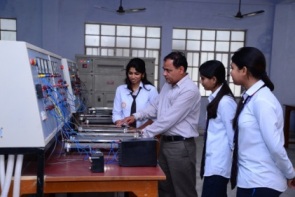
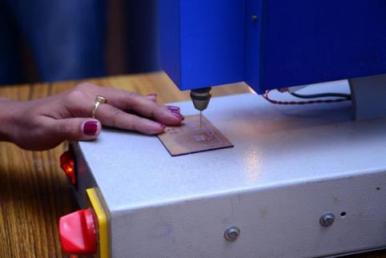
Overview : Best Electrical Engineering College in Jaipur
Electrical engineering is a field of engineering that generally deals with the study and application of electricity, electronics, and electromagnetism. This field first became an identifiable profession in the latter half of the 19th century after commercialization of the electric telegraph, the telephone, and electric power distribution and use.
What do electrical engineers do?
Electrical engineers direct electrical phenomena to useful purposes. Electricity lights our homes, helps us to cook our food, and powers the many household appliances we use to make our lives easier. Electricity also powers our factories and refineries. Electrical engineers are involved in every stage of generation or production, transmission, distribution and the application of that electrical energy. They also work in the area of low power electricity that is the basis for telecommunications, television, and computer technology. They may specialize in power systems, electronics, telecommunications, analog and digital signal processing, integrated circuits, microwaves, fiber optics, computers, lasers, microprocessors, radio astronomy, and biomedical engineering.
The essential subjects of Electrical Engineering which are taught in JEC Group usually include:
Career in Electrical Engineering
The Dictionary of Occupational Titles lists a number of occupations in electrical engineering. It describes them as concerned with applications of the laws of electrical energy and the principles of engineering for the generation, transmission and use of electricity, as well as the design and development of machinery and equipment for the production and utilization of electrical power
Within each of these specialty areas, electrical engineers could be involved in:
- Application design and technical sales. Electrical engineers use processes and components that are already available to develop new products to meet individual client needs. Production and manufacturing. Electrical engineers working in this area determine appropriate methods, materials, and equipment. They test procedures to be used in the production of safe, economical and high performance electrical products and services.
- Systems analysis and design. Using computers, electrical engineers design electrical generation and transmission systems. They create and maintain systems that transmit data over long distances. They work to improve telephone and telecommunications systems using advances in solid state, microwave, and fiber optic and satellite technology.
- Electrical engineering is one of the larger specialties in engineering, offering a wide range of options for employment. Engineers may work in power supply industries developing such things as hydroelectric power stations.
- They may create systems for buildings that control lighting, power, communications, security, heating and ventilation. They may design diagnostic imaging equipment or work in telecommunications, aeronautics, computer applications, space technology, automation, or electronics. From microwatts to megawatts, electrical engineers have a world of careers to choose from.
- Research. Studying electrically-related problems and conducting experiments on various electrical events. They evaluate the results to resolve practical problems and real situations. For example, experiments in the use of lasers have led to advances in laser surgery in medicine and dentistry.
Some of the notable designations of electrical engineers are
.png)
About the Department of Electrical Engineering!
The Department of Electrical Engineering at JEC has, over the years, grown into a full-fledged department offering undergraduate / Post Graduate courses in Electrical Engineering. It has so far graduated more than 4000+ Electrical Engineers who are contributing significantly to the development and running of various public and private organizations in India and abroad in the fields of academics, research, and social sector.
Department Advisory Council
The Department of Electrical Engineering has an advisory council, having members from teaching and industry / research organizations. The council meets at least once in a semester to review and evaluate performance of the department and offer advice in needed areas.
Impressive Results
Faculties take extra care of the students and in the knowledge delivery process throughout the course period. These dedicated and concentrated efforts have culminated in obtaining 100 % results in the final year. During the last three years, this department of JEC Group of Colleges has successfully achieved 100% results. In the postgraduate program, the department is consistently getting University ranks. The goal is now to be in tune with this trend and achieve top honors at the university level both in undergraduate & Post Graduate programs.
Research activity
The department has got latest state-of-the-art equipments / instruments to conduct basic and applied research. Department of Electrical Engineering caters to the needs of students by organizing various events like seminars, symposia on latest topics and trends of Electrical Engineering. The department has MOU’s with some of the leading industries to undertake undergraduate and postgraduate project works, Internship for Students.
Electrical Engineering Labs
Significant Laboratories that strengthen our Electrical Engineering department are
BASIC ELECTRICAL ENGINEERING LAB:It is common to all engineering students of first year to understand them about the basic concepts of generations of electricity, transmission and its distribution. In this lab students of first year perform experiments related to topics taught in theory like superposition theorem, Norton’s theorem, the venin’s theorem, open circuit and short circuit test of single phase transformers, etc. |
ELECTRICAL MACHINES LAB:This lab consist of number of machines like D.C. motors, shunt motors, D.C. generators, induction motors, three phase transformers, three phase alternators etc. on which students of second and third year perform experiments related to topics taught in theory. |
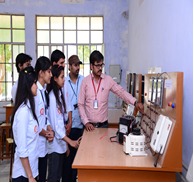 |
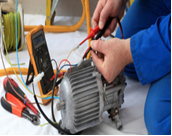 |
ELECTRICAL MEASUREMENT LAB:This lab consists of experiments related to measurement like Wein’s bridge, Wheatstone bridge, Kelvin’s double bridge, RTD, Thermocouple, Thermistor, etc. |
ELECTRIC DRIVES & CONTROL LABIn this lab experimental setups on which students of final year perform experiments related to topics studied in electric drives like speed control of D.C. motor, speed control of A.C. motor, etc. |
POWER ELECTRONICS LAB:This lab consists of experimental setups on which students of third year perform experiments related to topics studied in power electronics like half bridge rectifier, full bridge rectifier, half wave converter, full wave converter, inverter and as simulation experiments performed by Power Simulation software. |
POWER SYSTEM LAB:This lab consists of different relays like Differential relay, Over current relay, Thermal relay, Instantaneous over current relay, single line to ground fault analysis, three phase to ground fault analysis on which students of final year perform experiments related to topics studied in power system. |
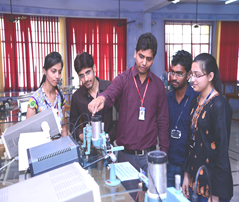 |
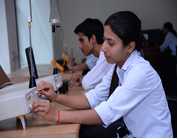 |
MAT LABMATLAB is maintained by the department for ensuring & serving in hrefmulti-paradigm numerical computing environment |
NETWORKS LAB:This lab consists of experiments related to topics covered in Network analysis & synthesis. |
MODELLING & SIMULATION LAB:This lab basically consists of about 20 computers on which various simulation softwares like Multisim, PSIM, Dapper, LabView and MATLAB have been installed. These softwares are being used by the students of second, third and final year students for lab as well as project work. |
CONTROL SYSTEM LAB:This lab consists of experiments performed on control system like position controller. |
 |

